|
|
|
Sort Order |
|
|
|
Items / Page
|
|
|
|
|
|
|
| Srl | Item |
| 1 |
ID:
119766
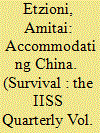

|
|
|
| 2 |
ID:
104598


|
|
|
| 3 |
ID:
173227
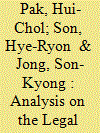

|
|
|
|
|
| Summary/Abstract |
At present, some states are undertaking military interventions in different parts of the world, contending the ‘legitimacy’ of their i006Evocation of responsibility to protect civilians from a humanitarian crisis. Discussions at international forums concerning the concept of Responsibility to Protect (R2P) are inconclusive about its legal nature and application. While some scholars and states support the doctrine of R2P as being legitimate, others challenge or take a rather sceptical view. Divergent views seem to be originating from its incompatibilities with the rules of international law, including the Charter of the United Nations. What is controversial is that the supporters of R2P are mainly from the West, while objections to R2P are from developing countries mainly from West Asia or Africa. This raises concerns about the possibility of future applications of R2P in any of the countries in these regions or other developing countries. The article, analyses the legal nature of R2P in terms of the main principles of international law and other sources of international law and argues that the legitimacy and international legal effect of R2P are uncertain.
|
|
|
|
|
|
|
|
|
|
|
|
|
|
|
|
| 4 |
ID:
092087
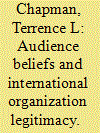

|
|
|
|
|
| Publication |
2009.
|
| Summary/Abstract |
Recent work suggests that multilateral security institutions, such as the UN Security Council, can influence foreign policy through public opinion. According to this view, authorization can increase public support for foreign policy, freeing domestic constraints. Governments that feel constrained by public opinion may thus alter their foreign policies to garner external authorization. These claims challenge traditional realist views about the role of international organizations in security affairs, which tend to focus on direct enforcement mechanisms and neglect indirect channels of influence. To examine these claims, this article investigates the first link in this causal chain-the effect of institutional statements on public opinion. Strategic information arguments, as opposed to arguments about the symbolic legitimacy of specific organizations or the procedural importance of consultation, posit that the effect of institutional statements on public opinion is conditional on public perceptions of member states' interests. This article tests this conditional relationship in the context of changes in presidential approval surrounding military disputes, using a measure of preference distance between the United States and veto-wielding members of the UN Security Council. Findings indicate that short-term changes in presidential approval surrounding the onset of military disputes in the United States between 1946 and 2001 have been significantly larger when accompanied by a positive resolution for a Security Council that is more distant in terms of foreign policy preferences. The article also discusses polling data during the 1990s and 2000s that support the strategic information perspective.
|
|
|
|
|
|
|
|
|
|
|
|
|
|
|
|
| 5 |
ID:
138435


|
|
|
|
|
| Summary/Abstract |
After the deterioration of Russian–Western relations over Ukraine, Moscow has shown itself keen to reinvigorate its relationship with Beijing as a preferred partner – especially but not exclusively in the all-important energy sector. In addition, the two countries’ common ambitions for a multipolar international structure enhance the mutual benefits of a strong partnership. Yet, Sarah Lain argues, the Sino–Russian relationship is characterised by increasing inequality, as Moscow finds itself needing Beijing more than Beijing needs Moscow.
|
|
|
|
|
|
|
|
|
|
|
|
|
|
|
|
| 6 |
ID:
094479


|
|
|
|
|
| Publication |
2010.
|
| Summary/Abstract |
After 9/11, U.S. President George W. Bush announced his determination to do whatever was necessary to prevent future terrorist attacks against the United States. Following the lead of several countries that had recently come to similar conclusions after their own bitter experiences -- including India, Israel, Japan, Russia, Spain, and the United Kingdom -- the United States tightened its immigration laws; increased the protection of its borders, ports, and infrastructure; criminalized providing "material support" for terrorist groups; and tore down the wall between the intelligence agencies and law enforcement agencies, which had crippled counterterrorist efforts for decades. Washington did not authorize preventive detention, as other countries had, but it used other measures to hold persons against whom criminal charges could not be brought -- thereby preventing terrorist attacks. The U.S. government also led or joined various international efforts aimed at warding off new dangers, such as the Proliferation Security Initiative, through which over 70 states cooperate to interdict the movement of nuclear materials across international borders.
|
|
|
|
|
|
|
|
|
|
|
|
|
|
|
|
| 7 |
ID:
179812
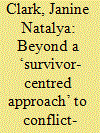

|
|
|
|
|
| Summary/Abstract |
In Resolution 2467 (2019), the most recent addition to the Women, Peace and Security (WPS) agenda, the UN Security Council embraced the idea of a ‘survivor-centred approach’ to preventing and responding to conflict-related sexual violence. While this terminology is now widely used in international policy circles, the general lack of critical reflection on the concept of survivor-centrism is striking. Addressing this gap, this interdisciplinary article seeks to demonstrate that a survivor-centred approach, by itself, is too narrow. It utilizes the ecological concept of connectivity—which refers to connections that enable and facilitate vital ecological processes—and repurposes it in a social science context to develop the article's core argument: that survivor-centred discourse marginalizes, or neglects, the fundamental webs of connectivity in which the everyday lives of those who have suffered conflict-related sexual violence are intricately interwoven. The article draws on qualitative interviews with victims/survivors of conflict-related sexual violence in Bosnia and Herzegovina, Colombia and Uganda to empirically develop two particular ‘connectivity critiques’ of survivor-centred discourse, focused on resources and health respectively. Ultimately, it is not advocating the abandonment of a survivor-centred approach, but, rather, a social-ecological reframing of it. It presents connectivity as a new conceptual approach for thinking about and dealing with conflict-related sexual violence.
|
|
|
|
|
|
|
|
|
|
|
|
|
|
|
|
| 8 |
ID:
176059
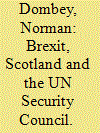

|
|
|
|
|
| Summary/Abstract |
If Scotland, spurred by Brexit, becomes independent, it is conceivable that the United Kingdom will lose its permanent seat on the UN Security Council.
|
|
|
|
|
|
|
|
|
|
|
|
|
|
|
|
| 9 |
ID:
117026
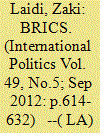

|
|
|
|
|
| Publication |
2012.
|
| Summary/Abstract |
The BRICS' impact can be evaluated based on the degree of political coherence among them, as well as their capacity to influence the international system. This article will from the outset assume that the BRICS form a heterogeneous coalition of often competing powers that share a common fundamental political objective: to erode Western hegemonic claims by protecting the principle which these claims are deemed to most threaten, namely the political sovereignty of states. The BRICS form a coalition of sovereign state defenders. While they do not seek to form an anti-Western political coalition based on a counter-proposal or radically different vision of the world, they are concerned with maintaining their independence of judgment and national action in a world that is increasingly economically and socially interdependent. They consider that state sovereignty trumps all, including, of course, the political nature of its underpinning regimes. Thus, the BRICS - even the democratic ones - fundamentally diverge from the liberal vision of Western countries.
|
|
|
|
|
|
|
|
|
|
|
|
|
|
|
|
| 10 |
ID:
162526


|
|
|
|
|
| Summary/Abstract |
Following the June 1967 Six-Day War, the Soviet Union and Britain invested significant efforts in rehabilitating their relations with the Arab countries, notably Egypt. While both supported the withdrawal of Israel from the Arab-occupied territories, the two countries differed over the nature of the settlement. Still, at the UN Security Council, the Soviet Union supported the British draft resolution for solving the Middle East conflict. Cold War interests and competition over influence in the Middle East, however, led the Soviets to launch a public campaign against British policy in the Middle East and prevented the two countries from joining efforts to bring about a breakthrough in the Arab–Israeli conflict.
|
|
|
|
|
|
|
|
|
|
|
|
|
|
|
|
| 11 |
ID:
142389


|
|
|
|
|
| Summary/Abstract |
The July 14 agreement between Iran and the six-country group known as the P5+1 established a set of important limitations and related transparency measures on Iran’s nuclear activities.
|
|
|
|
|
|
|
|
|
|
|
|
|
|
|
|
| 12 |
ID:
089348
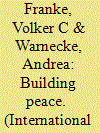

|
|
|
|
|
| Publication |
2009.
|
| Summary/Abstract |
After a brief introduction, this contribution comprises a tabular inventory of the 69 UN peace missions since the end of the Cold War. It highlights the structural features of each mission, the background to crisis and the mission's contributions to security, socio-economic well-being, governance, justice and reconciliation.
|
|
|
|
|
|
|
|
|
|
|
|
|
|
|
|
| 13 |
ID:
129305
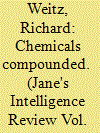

|
|
|
| 14 |
ID:
172559


|
|
|
|
|
| Summary/Abstract |
While China and Russia's general policies towards the Responsibility to Protect (R2P) are similar, the two reveal nuanced differences in addressing specific emergencies. Both express support for the first two pillars of R2P while resisting coercive intervention under its aegis, as they share anxieties of domestic political security and concerns about their international image. Nonetheless, addressing cases like the Syrian crisis, Russian statements are more assertive and even aggressive while Chinese ones are usually vague and reactive. This article highlights the two states’ different tones through computer-assisted text analyses. It argues that diplomatic styles reflect Russian and Chinese perceptions of their own place in the evolving international order. Experiences in past decades create divergent reference points and status prospects for them, which leads to their different strategies in signalling Great Power status. As Beijing is optimistic about its status-rising prospects, it exercises more self-restraint in order to avoid external containments and is reluctant to act as an independent ‘spoiler’. Meanwhile, Moscow interprets its Great Power status more from a frame of ‘loss’ and therefore is inclined to adopt a sterner approach to signal its status. Although their policies complement each other on many occasions, there is nothing akin to a Sino–Russian ‘bloc’.
|
|
|
|
|
|
|
|
|
|
|
|
|
|
|
|
| 15 |
ID:
094973


|
|
|
|
|
| Publication |
2010.
|
| Summary/Abstract |
On May 25, 2009, North Korea conducted an underground test of a low-yield nuclear device, flaunting a Security Council resolution that had been passed in the wake of that state's first test two-and-a-half years before. The world waited 18 days for the Council to take concrete action in the form of a new round of sanctions. Although the measures passed were robust, some observers noted that China, with Russia, tried to 'dilute' them by making enforcement of financial sanctions non-mandatory, and complicating the practice of cargo inspections. Concerns were also raised about the extent to which China, wary about destabilizing North Korea and protecting its relations with Pyongyang, might be willing to implement the new provisions.1 More broadly, this case fits into a sequence of misgivings about China's participation in deliberations on a host of 'pariah' states, including North Korea, Iran, Myanmar, Sudan and Zimbabwe.
|
|
|
|
|
|
|
|
|
|
|
|
|
|
|
|
| 16 |
ID:
126384


|
|
|
| 17 |
ID:
100614
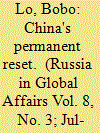

|
|
|
| 18 |
ID:
084184
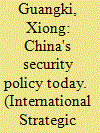

|
|
|
| 19 |
ID:
107690


|
|
|
| 20 |
ID:
183780
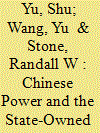

|
|
|
|
|
| Summary/Abstract |
China has become a leading source of outward foreign direct investment (FDI), and the Chinese state exercises a unique degree of influence over its firms. We explore the patterns of political influence over FDI using a comprehensive firm-level data set on Chinese outward FDI from 2000 to 2013. Using six country-level measures of affinity for China, we find that state-owned and globally diversified firms appear to conform most closely to official guidance. Official investment directives and state visits link investments to state policies; Taiwan recognition and Dalai Lama meetings anchor our political interpretations; and UN General Assembly voting and temporary UN Security Council membership suggest that this intervention may be systematic. The results are robust to country, year, and sector fixed effects, and most do not hold for private or small firms. The results suggest that China uses FDI by prominent state-owned enterprises as an instrument to promote its foreign policy.
|
|
|
|
|
|
|
|
|
|
|
|
|
|
|
|
|
|
|
|
|